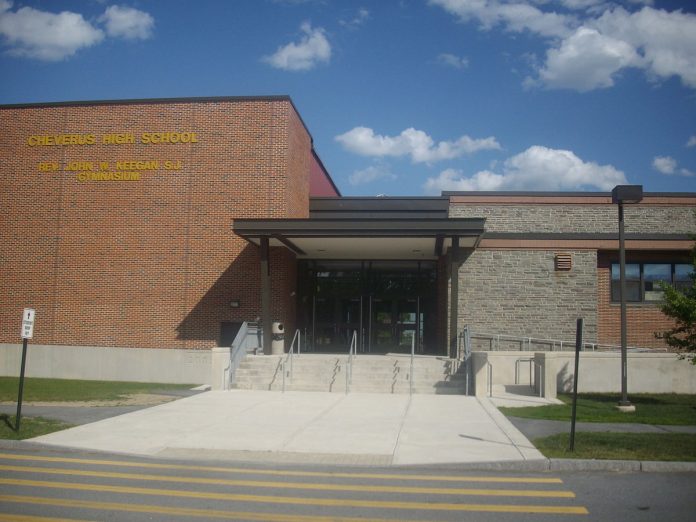A Jesuit school in Maine is the first to take advantage of a U.S. Supreme Court ruling allowing families to use public funds at parochial schools.
Cheverus High School in Portland, Maine is cutting a new path for students and parents who would like to have some of their own tax dollars back to pay for a private, religious education.
The Roman Catholic preparatory high school is the only school in the state so far to capitalize on a U.S. Supreme Court ruling this past June that overturned Maine’s ban on the use of public funds at religious schools. The decision in Carson V. Makin could create new opportunities not just in Maine but across the country, says Marc LeBlond, director of policy for EdChoice, a nonprofit organization that supports school choice initiatives.
“Hopefully, we will see tuition move much more freely, and we could possibly see new schools spring up,” LeBlond said. “Tuition dollars are not so bound anymore to the type of school, from a constitutional perspective.”
Before the court ruling, Maine had been providing free public education in the state’s less-populated areas where some school districts declined to operate secondary schools. The districts would send students to other private schools or a private school that the parents selected. Government funds, however, could only be used at schools that did not provide religious instruction.
Maine families opposed to the policy went to court arguing that by excluding religious institutions, government officials were violating the First Amendment’s Free Exercise Clause. The court agreed.
Writing for the majority, Chief Justice John Roberts stated in the Court’s opinion, “a neutral benefit program in which public funds flow to religious organizations through the independent choices of private benefit recipients does not offend the Establishment Clause. … Maine’s decision to continue excluding religious schools from its tuition assistance program … thus promotes stricter separation of church and state than the Federal Constitution requires.”
Maine officials approved the first religious school application for public tuition funds from Cheverus High School in September. In its mission statement, Cheverus describes itself as “an inclusive Jesuit Catholic college preparatory school” that “teaches students to be people for and with others to pursue intellectual, spiritual, physical and personal excellence for the greater glory of God.”
With the Court banning discrimination against parochial schools, the Maine legislature may consider other ways to keep funding away from those institutions, LeBlond says.
“Basically, what the Chief Justice said is that there is no requirement that the government fund private schools, but he also said that if they do, they can’t discriminate,” LeBlond said. “I’m wondering now how the Maine legislature is going to respond. Whenever you have a decision of this magnitude, it is typically followed by some type of legislation.”
In a lengthy statement after the Court ruling, Maine Attorney General Aaron Frey said he was “terribly disappointed and disheartened” by the decision. Frey said any educational institutions that receive public funds “must comply with the anti-discrimination provisions of the Maine Human Rights Act, and this would require some religious schools to eliminate current discriminatory practices.”
Aaron said he intends to confer with Maine Gov. Janet Mills and the legislature “to address the court’s decision and ensure that public money is not used to promote discrimination, intolerance, and bigotry.”
In the case before the high court, it was the government that was called out for discriminatory practices. In his opinion, Roberts said Maine’s decision to exclude religious schools “effectively penalizes the free exercise of religion.”
In a statement on behalf of the Catholic League, a Christian civil rights organization, Michael McDonald, the league’s communication director, described the ruling in favor of Maine families as “a great victory for both religious liberty and school choice.”
“The Court makes clear that states cannot discriminate against a school for holding a religious viewpoint,” McDonald said in the statement. “If the state is going to subsidize school choice programs, then they cannot neglect to support religious schools. This will ultimately help students, giving them more top-quality schools to choose from to avoid the failing public school systems.”
LeBlond says school choice is gradually gaining momentum throughout the country, thanks in part to Supreme Court rulings dating back to Zelman v. Simmons-Harris in 2002. In that decision, the justices upheld a school voucher program in Ohio. LeBlond says he is encouraged by current trends in key states.
“Pennsylvania scored a big victory earlier this year in the form of expanded tax credit scholarships, and in Arizona they are doing everything, including education savings accounts, vouchers, and charters,” LeBlond said.
“All options should be on the table for empowering parents with the maximum range of educational choice and freedom,” LeBlond said.
For more great content from School Reform News.
For more from The Heartland Institute.








